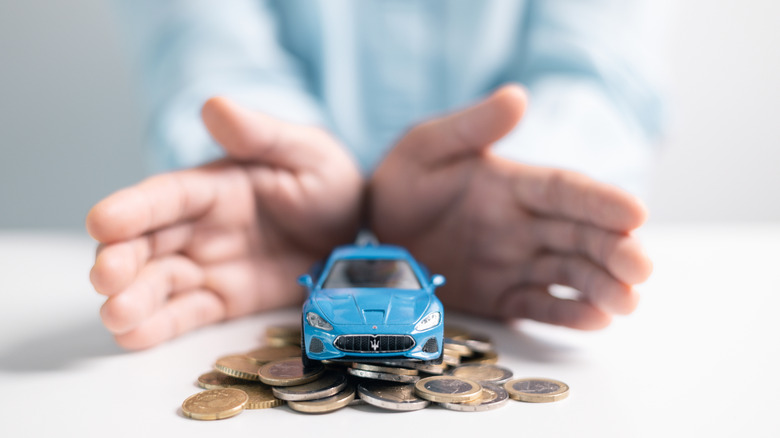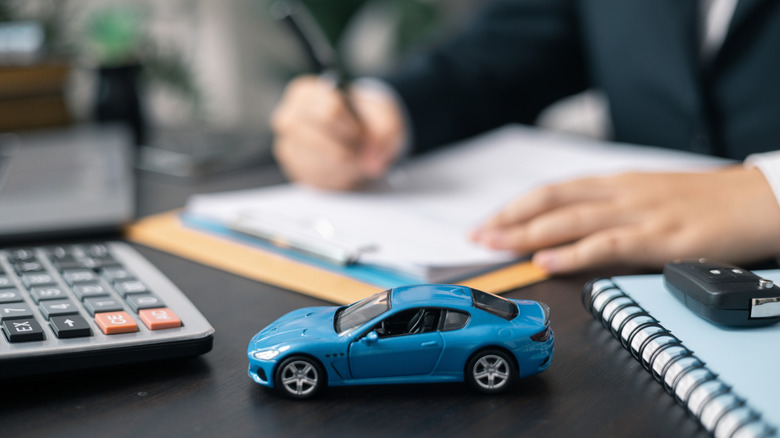12 Things First-Time Buyers Always Get Wrong About Buying A New Car
The experience of buying a new car can be exciting and gut-wrenching all at the same time. Heading off to a dealership to explore options and negotiate a deal you're happy with is an endeavor you may have imagined hundreds of times during your research. But for anyone actually going through this process, the real world experience is often much different from the romanticized visions in your mind's eye. Car dealers are a clever bunch, and they use a variety of methods to steer the conversation with buyers in their favor.
This is particularly true of interactions car salesmen have with first-time buyers. As a novice in the car buying arena, you may be susceptible to a few simple mistakes and vulnerabilities that dealerships work to capitalize on. Unlike a grocery store, with listed prices and a business model that is largely customer-driven, a car dealership is a place of negotiation and sometimes high pressure. It's easy to find yourself in the hot seat if you aren't fully prepared for the task ahead.
Fortunately, avoiding some of these mistakes is as simple as planning ahead. Opting to bring a friend or family member along can help ease the tension, and seeking pre-approval for your own source of financing can swing the conversation back to neutral footing. Here are some of the most common mistakes that first-time buyers find themselves making.
Only shopping at the nearest dealership
The first mistake that a novice car buyer might make involves location. There are so many options when it comes to purchasing a new car that many people fall into the trap of focusing on a single brand and locking themselves into working with just one dealership. In the same way that shopping around for new TV involves comparing prices, buying a new car also involves lots of research — and an understanding that getting the best deal doesn't necessarily mean patronizing your local dealership.
In many communities there might be dozens of car sale outlets to choose from, and hundreds more car dealerships nearby. Unlike most other products you might purchase, a new car is a one-of-a-kind good. Toyota produces thousands of Tacoma pickup trucks, but the one you're looking at on the lot has experienced a completely different life cycle than a separate example located down the road. Because of these unique quirks inherent to every car purchase, prices can be wildly different. The best car for your needs (combining price, mileage, service history, and more) might be found nearby or a bit farther away. Branching out and looking at listings online and visiting dealerships in person around your community can help you get your ducks in a row when targeting the perfect car for your needs.
Shopping for brand new cars
Speaking of new cars, many first-time buyers think a brand new model is the be-all and end-all. Some new cars are relatively cheap, but for most, a new car is a luxury that just isn't worth the price tag. While every vehicle is different, the average new car loses roughly 20% of its value in the first year. That's a steep markup for what amounts to minimal changes between most individual model years.
Some car buyers entering the marketplace for the first time might be tempted to think that a used car is somehow defective as a general rule. Because you can't know with absolute certainty what the car has experienced prior to your encounter with it, it can be easy to approach used vehicles with intense skepticism. The financial demands of a brand new car purchase are simply exorbitant, though, and most car buyers should steer clear of the alluring newness of a current model year offering. Even cars just one year old can offer significant savings.
A good compromise lies in a dealership's certified pre-owned program. Most dealerships offer some kind of certification for their best used vehicles. These cars have been inspected for damage and defect. When they sell, they come with extended warranty offers and other perks, too. Naturally, a certified model will cost more than a standard used vehicle. But by indulging in this upgrade, you'll be driving away in a car that the dealership stands behind, giving you an important assurance of quality.
Forgetting about insurance costs
Insurance is a part of the financial picture of car ownership that is simply unavoidable. Every state has its own specific requirements for coverage levels, and drivers themselves will need to think about their own priorities when signing up for a new policy. But these considerations are often kicked down the road when people wander around a dealership lot. The sheen of a new car can blind buyers to the additional financial demands of a car purchase.
Car enthusiasts often advise new buyers to start by doing research into the kind of car they want to drive. But after this process has been completed, there's an additional step that first-timers may not immediately think about. Instead of heading off to the dealership to explore options in person, pick up the phone and call insurance companies to get prospective quotes for the vehicle you're considering.
Calling one or two providers to understand how much any given vehicle is likely to cost you in ongoing insurance payments can help bring the total financial impact of your decision into greater focus. You might be able to afford the vehicle but have trouble paying to maintain it on the road. On the other hand, you might find that insurance costs less than expected, allowing you to move up to a newer model year or upgrade your search to a larger vehicle or premium trim selection.
Exploring car options based on monthly payment figures alone
Remaining on the topic of financing your purchase, it's important to go into a new car search understanding that dealerships want you to pay monthly. Dealerships aren't just sales centers, but also make a considerable amount of money on in-house financing plans. One of the most profitable offerings for a dealership are its service contracts. But following closely behind these services is the money a dealership makes from in-house financing and commissions for arranging loans through third-party providers.
Frequently, direct-from-dealership financing offers are substantially more expensive than independent pre-approval you might seek from a bank or even your credit card provider. Arriving at the dealership with pre-approval for a loan can help you negotiate, but it won't protect you from one of the dealership's unique tricks.
Salespeople working in this industry tend to frame purchase prices as a monthly installment rather than talking about the total cost. Speaking about monthly payments makes you think about a car purchase with a low dollar figure in mind. It's hard to translate this into total cost, which is much higher than the outright purchase price when you factor in the interest rate. This is a trick that dealerships use to sell you the same car for a big markup, even after you've negotiated a lower sticker price.
Skipping the test drive
The actual value of a particular car is something that can be difficult to quantify for first-time buyers. Car dealerships spend a lot of time buffing up vehicles they put on their lot. Cars listed for sale often look fantastic and have every little detail accounted for to entice buyers. But when it comes to looking under the hood, not every little nagging problem will be fixed — or obvious. A dealership is generally selling a vehicle as is, so unless a problem absolutely has to be resolved in order to move the product, dealerships aren't generally inclined to shell out for fixes. Every dollar they spend on a vehicle is potentially a dollar lost.
People working in the car sales industry aren't necessarily looking to pull one over on their customers, but they also aren't in the business of enriching them. Generally, salespeople won't outright lie to you about a car's history or its service issues, but if you don't ask, they almost certainly won't tell you if there's a problem. This is why the test drive is so important. Because every car has its own unique history and wear patterns, getting behind the wheel and driving the car allows you to explore what it can and can't do. Once you buy the car, you inherit all of its potential issues, but if you discover a problem before purchasing you can target a different vehicle or perhaps work out a deal to reduce the price or get it fixed.
Trusting everything a car dealer says
Most car salespeople are simply doing their jobs: After all, they're human too. But the common trope about deceptive or sneaky salespeople in the automotive industry didn't spring up overnight, or without plenty of negative experiences along the way.
Common wisdom suggests that when a salesperson in the showroom is speaking to you, they're lying about something. While this might be overblown, it's important to remember that a salesperson trying to put you in a new car isn't looking out for you, they're acting on their own self-interest. Some will resort to lying outright or by omission if they think it will help them seal the deal and earn their commission check.
The buyers most vulnerable to this kind of trickery are those without experience. A fib, either large or small, is only valuable if salespeople think they can get away with it. If you catch a salesperson in a lie, it will immediately shift the dynamics of your interaction and perhaps tank the sale altogether. It's alright to form a human connection to the person you're dealing with, but remember that they are looking out for themselves and may embellish or exaggerate in order to put you at ease and speed along the process of selling you a car, even if the outcome you're moving toward isn't the best thing for you.
Falling in love with a car at the dealership (and signaling that interest)
Salespeople are astute when it comes to taking cues from body language and guessing what prospective buyers are thinking about. They are particularly interested in potential buyers who have fallen in love with a car. Even though vehicles are rolled off the production line in droves, each one that you encounter at the dealership is a kind of unique snowflake. Once that car has been sold, the individual product is gone. You might be able to find another like it — almost an identical copy, even — but you won't have that one. Salespeople know this, so when they find a buyer who wants "that particular one," they know that they have leverage.
They might highlight its scarcity by talking about others who have looked at the vehicle or hold firm on the sticker price. These are all tactics to boost profits, and they work well on inexperienced buyers who have become attached. It's alright to want a specific car, especially considering that you'll be buying one specific car. However, you should always try your best to keep expressions of that interest to a minimum.
Becoming timid when it comes time to negotiate
The negotiation phase is a tense one. Automotive sales aren't just about the car itself, and a dealership may try to tack on all kinds of service extras and inclusions that raise the price and boost their bottom line. This is a time to stand firm and speak up for what you want.
With that being said, it's unreasonable to think that you're going to bend anyone totally to your will when negotiating a car purchase. You might have a particular price in mind, but you may have to compromise on that aspect in order to walk away with a new set of keys. Still, that doesn't mean you should just accept whatever the dealership offers or pay added fees without question. Any fee that's been added to a contract can be removed just as easily as it was placed there.
Anything you don't agree with should be brought up during this conversation. Be prepared for a back and forth, and perhaps even a long-winded explanation of why some fee exists in the contract. Just remember that the entire experience is negotiable, and if you don't agree with something, stand firm on what you want. The reality is that you don't get what you don't ask for, and in most cases the dealership is asking for more than they're willing to accept, because they know most people aren't prepared to haggle for what they want instead.
Accepting additional accessories or services without thinking over the final offer
Negotiation inside a dealership's office can go a number of ways. Salespeople will look to focus on monthly payments, as noted, and gloss over things like service fees, transportation charges, detailing expenses, and a potential smorgasbord of other added fees. The world of fees has grown tremendously in recent years, and everyone is looking to stiff the consumer with a few extra bucks here and there. Buyers should always look to hold firm on removing these excess and overwhelmingly frivolous charges. Added costs like taxes are unavoidable, but a "dealer's surcharge" or anything similarly vague is just a way to get you to pay more for no reason at all.
Beyond added fees that seemingly offer no tangible benefit to you, you'll also want to look out for additional costs that do purportedly offer something. Salt treatments, paint sealants, window tint, LoJack services, or even a full tank of gas are often thrown into the mix and then used as an upcharge on the paperwork. Some of these services are totally useless, and others you just don't need. Some others come standard with the vehicle you're buying or might be inclusions that you can purchase yourself for a fraction of the cost. Any added cost that you see in the paperwork should be questioned before you sign on the dotted line. Some may be worthwhile, while others are boldfaced attempts to part you from more of your money.
Forgetting to bring a second set of keys if you're trading in a vehicle
Perhaps you've been gifted a car from your parents or some other loved one and now need to upgrade. No matter how you came into possession of a trade-in without first becoming an experienced car buyer, there's a unique feature of the trade-in process that you may not have considered before setting off for the dealership. That is the reality that salespeople will deploy lots of little tricks to attempt to keep you within their grasp. If you tell a dealership up front that you're looking to trade your existing car, they'll often invent a means of shifting the focus onto that vehicle rather than the one you want to buy.
Dealerships may attempt to give your vehicle a once-over, requiring you to give them the keys. This is a deception employed to place a physical and psychological barrier between you and the act of leaving. Bringing a second set of keys along with you negates this trick and allows you to bail on the conversation without hesitation if the pressure becomes too much to handle in the moment. It's an important contingency to keep in mind, but hopefully one you won't have to rely on!
Failing to consider resale value alongside other traits
When you go shopping for a new car, you are often looking at the aesthetics of the vehicle above many other aspects. Seating arrangements, engine power, and even alternative power options — like an EV propulsion system that might earn you a tax credit – also feature heavily in the buyer mindset. But one element of the experience often flies under the radar until it's too late. If you fail to consider the resale value you can expect with a new car purchase, you may be setting yourself up for a weaker bargaining position the next time you want to buy a new vehicle. And most car owners in the United States hold on to their vehicle for a maximum of eight years, according to a Zebra survey.
Understanding what your resale value will look like can help you make decisions about which car to buy more intelligently. A car with good resale value will go a longer way to offsetting the purchase price of your next car, so it's an aspect of today's car buying experience that must not be forgotten about. Cars with good resale value set you up for better financial mobility later on, while those that lose a considerable amount of monetary value can be a detriment to your future self.
Going alone to shop for a new car
Finally, it's always a good idea to bring someone with you to bounce ideas off of and ease the tension. An ally is especially important if you are buying a car for the first time and don't know what to expect from your interactions at a dealership. Salespeople are experienced conversationalists and are very good at shifting the conversation to steer you toward the decision to buy a car. With someone in your corner, it's easier to halt that conversation and take a step back to think.
Your ally might be a parent or friend, and even if they don't have experience in the car buying process themselves, they can help you by interjecting if something doesn't sound right. Even if your companion doesn't ever speak during the interaction, just the fact that they are standing with you can be enough to give you the confidence to say your piece and get what you want. Just remember, a salesperson isn't looking to rob you, but they aren't your ally either. Bringing a friend along can shift the balance a little farther into your favor.












